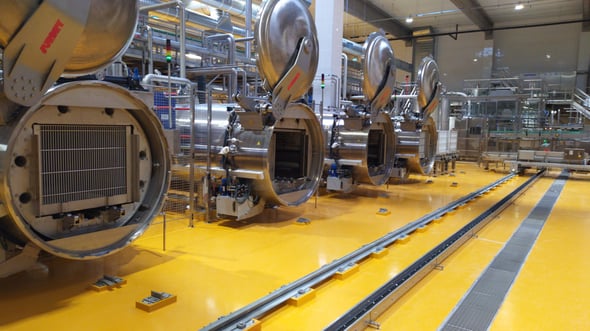The lack of proper retort maintenance causes numerous problems, which can be very serious. As a result of the wear and tear of the equipment's control components, the accuracy of the data and the performance of the entire retort may be affected. In addition, incorrect maintenance will complicate the operation of the machinery and may even render it unusable. In the worst-case scenario, it will result in incomplete sterilization cycles, putting food safety at high risk.

Preventive maintenance of industrial retorts is essential and, if carried out correctly, offers many benefits:
It avoids complications and unplanned machine downtime.
The following complications are likely to occur:
- The door does not close completely before the cycle starts or does not open at the end of the cycle.
- Roller tracks that do not slide the load properly.
- Chain jamming prevents the load from being transported into the retort.
- Failure of the drum rolling systems, preventing rotation.
- Incorrect recording of the drum rotations by the encoder.
- Motor does not rotate or pull the load.
- Water leakage in the vessel.
- Pump cavitation or failure to push water through the recirculation system.
- Filter clogging is caused by dirty process water.
- Overflow of the process water at the end of the cycle.
These situations lead to machine performance failures and are likely to result in high costs due to breakdowns and production downtime. We can avoid these mishaps by carrying out a correct maintenance program in the autoclave.
Ensure the accuracy of the system data
If the temperature, flow, and pressure sensors do not register the data correctly, it can be due to wear in the components that control the sterilization process. An error in these variables can have serious consequences, affecting food quality and food safety.
The monitoring and recording of process data is an essential aspect of food and beverage sterilization, guaranteeing the product's full traceability. The best way to ensure its proper functioning is through preventive maintenance.
Prevent cracks
High temperatures and the accumulation of corrosive substances, such as chlorides and H+ ions, may cause cracks in the autoclave. If such damage occurs, it is necessary to replace the retort with new equipment, and it is essential to detect it early as it can put the operators' safety and production at risk.
On the other hand, monitoring and controlling the process water parameters. It should always be within the following ranges:
- pH: 5.5 - 8.0.
- Maximum chlorine concentration 1-1.5 ppm.
- Total hardness 3 - 5 ºdH or 54 - 90 ppm.
Maximizes the performance of the entire installation and saves costs.
Preventive maintenance is also focused on implementing measures to ensure the efficiency of the autoclave and the entire sterilization process. If these actions are not considered, it is likely that, over time, the facility will become inefficient and generate excessive expenditure of energy and water resources.
Early detection and management of process incidents and audits to improve energy efficiency will substantially increase the plant's productivity. Good maintenance, therefore, saves costs in both the medium and long term.
Ensure complete sterilization and avoid food safety risks
The lack of maintenance can lead to heat transmission loss, low steam emission during the process, or leakage due to seal wear, among others. In addition, deterioration in the control systems can cast doubt on the sterilization process data.
In these situations, temperature deviations and pressure failures are possible and will be detrimental to the product. If an excessive level of heat occurs, the product's organoleptic properties and nutritional quality will deteriorate. On the other hand, if the temperature established in the recipe is not reached, the consequences are even more severe since the harmful micro-organisms will not be eliminated, and the health of consumers will be put at risk. On the other hand, if there are errors in the pressure levels, it is possible that the containers may be damaged or even broken during sterilization.
It is highly recommended to carry out a preventive maintenance program within the autoclave facilities for all these reasons. Avoid repair and equipment replacement costs and achieve greater efficiency, and, more importantly, ensure total product safety.


